Are hope and despair both self-fulfilling prophecies?
.
Soldiers faced a difficult “final exam” of a march across the desert in full gear. “The study manipulated the soldiers’ hopes – and fears – about the difficulty of the march. The goal was to determine what, if any, impact their psychological state had on their physical performance.”
Via Maximum Brainpower: Challenging the Brain for Health and Wisdom:
…I developed the idea of manipulating hope to understand how optimism and pessimism affect the brain. The result was a large-scale study that demonstrated the role that hope, fear, and stress play in shaping our lives. Probably the first scientific study of hope, it involved soldiers who, after a year of advanced training, faced a “final exam” that consisted of a fast, arduous march across the desert with full pack and battle gear…
The study manipulated the soldiers’ hopes – and fears – about the difficulty of the march. The goal was to determine what, if any, impact their psychological state had on their physical performance.
All the soldiers would be marching 40 kilometers.
But they messed with the soldiers’ heads by telling one group that they’d be marching 40 kilometers, another group they’d be marching 30 kilometers, and another group they’d be marching 60 kilometers. A final group wasn’t told the distance. (All of them had successfully done a 40km march before.)
How did the information affect performance? Dramatically.
The difference in the soldiers’ performance was caused by what they were told about the hike before they began.
Who finished first?
- The group that was told the accurate distance (40km).
- Second place went to the group with the optimistic belief it was only 30km.
- Third place went to the soldiers who weren’t told about the distance.
- Last place was the group who thought it was 60km. One third of this group dropped out after only 10km, “a distance they they normally ran before breakfast each day.”
What to take away from this?
We might assume that the best information wins, but that is not the case. What mattered was how closely the anticipated challenge matched the soldiers’ actual capabilities.
Those told nothing or told 60km psyched themselves out. And it didn’t just affect them mentally, it also affected them physically:
We took blood samples from the four groups to see how the experience affected each group’s stress hormones… The soldiers who never knew the actual length of the march were asked at the end to estimate its length. The levels of stress hormones in their blood corresponded to the length they thought it was, not the length it actually was.
Why? “Both hope and despair are self-fulfilling prophecies.”
Via Maximum Brainpower: Challenging the Brain for Health and Wisdom:
…the brain does not want the body to expend its resources unless we have a reasonable chance of success. Our physical strength is not accessible to us if the brain does not believe in the outcome, because the worst possible thing for humans to do is to expend all of our resources and fail. If we do not believe we can make it, we will not get the resources we need to make it. The moment we believe, the gates are opened, and a flood of energy is unleashed. Both hope and despair are self-fulfilling prophecies.
Join over 190,000 readers. Get a free weekly update via email here.
Related posts:
How To Stop Being Lazy And Get More Done – 5 Expert Tips
How To Get People To Like You: 7 Ways From An FBI Behavior Expert
New Harvard Research Reveals A Fun Way To Be More Successful




